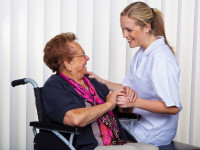When you hear that someone is addicted to drugs or alcohol, what image do you have in your mind? Is it of a person who is younger or middle-aged?
You may be surprised to learn how common drug and alcohol addiction are among the older population.
In fact, 2.5 million older adults are addicted to drugs or alcohol, according to the University of Pennsylvania Health System.
When elderly people are admitted to the hospital, the cause in 6% to 11% of cases is alcohol or drug addiction.
As if that’s not enough, widowers over age 75 have the highest rate of alcoholism, the University of Pennsylvania reports. And we have all heard about the problems with opioid addiction plaguing the U.S. right now, including among the elderly.
Causes of alcohol or drug abuse among the elderly can include boredom, a desire to feel numb, or using substances to replace love and intimacy that is no longer available or hard to find.
At the same time, the abuse can be hard to spot in older persons because loved ones may mistake symptoms for aging. It’s also common for elderly addicts to be able to hide their use. If someone is using multiple medications and sees multiple health care providers, it can be hard for a trained professional to see the addiction, the University of Pennsylvania reports.
Some signs of drug or alcohol abuse among the elderly include the following, as shared by the National Council on Alcoholism and Drug Dependence (NCADD):
- Solitary or secretive drinking.
- A ritual of drinking before, with, or after dinner.
- A loss of interest in hobbies or pleasurable activities.
- Drinking in spite of warning labels on prescription drugs.
- Immediate and frequent use of tranquilizers.
- Slurred speech, empty liquor and beer bottles, smell of alcohol on breath, change in personal appearance.
“The fact is, although alcohol and drug abuse is harmful at any age, it is never more harmful than on the elderly,” the NCADD reports. “The impact of alcohol- and drug-related injuries is much more severe, the risk of harmful medication interactions is much greater, and the general physical effects of alcohol and drugs are more debilitating.”
If you suspect that an older loved one has a substance abuse problem, plan to proactively sit down with him or her. Be gentle but also direct and specific, the University of Pennsylvania recommends. Avoid being judgmental; if you can, reach out to his or her physician. Seek professional treatment to help your loved one.
Call Secure Aging to Find Out How We Can Help Seniors With Financial Management
At Secure Aging in Bradenton, we transform the weight of the world into a sigh of relief for our senior clients and their concerned family members. The mission of Secure Aging is to protect and preserve our client’s independence and dignity through careful and thoughtful financial and care management. As our clients age, it is their desire to remain independent and age with dignity. Our services protect our clients from talented con artists looking to exploit and deplete the financial resources of our vulnerable seniors. Secure Aging helps families in Manatee County and Sarasota County and in and around the communities of Anna Maria, Bradenton, Bradenton Beach, Ellenton, Holmes Beach, Lakewood Ranch, Longboat Key, Myakka City, Palmetto, Parrish, and Sarasota. Call us at 941-761-9338, or visit us online at www.secureaging.com.




Comments are closed